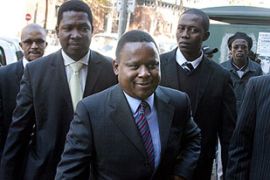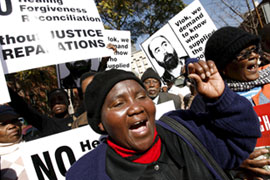Apartheid-era minister avoids jail
Former security minister and four South African policemen admit attempted murder.

Rights abuses
| In video | ||
|
|
Street protests were held outside the court as the trial got under way, with some demonstrators demanding that
Vlok be prosecuted for other human rights abuses.“We want justice to be done to these guys… We suffered a lot [and] people were shot and killed by police at that time,” Lenni Makhiwame said, one protester holding a placard reading “Apartheid is a crime against humanity”.
A rival protest by members of Afriforum, a whites-dominated civil rights group, demanded that ruling African National Congress (ANC) leaders accused of atrocities in the 1980s also be brought to justice.
“ANC leaders are not above the law,” read one banner.
Critics had said the trial would harm efforts at reconciliation, but supporters of the judicial process say there can be no real reconciliation unless the truth was unveiled.
The two men have recently made peace.
Last September, Vlok even washed Chikane’s feet in an act of contrition seen as hugely symbolic in a country where many people consider themselves to be devout Christians.
 |
| Protesters outside court demanded that Vlok face trial for other alleged abuses [EPA] |
But while Chikane said he had has forgiven Vlok, he said he could not stop the court process.
